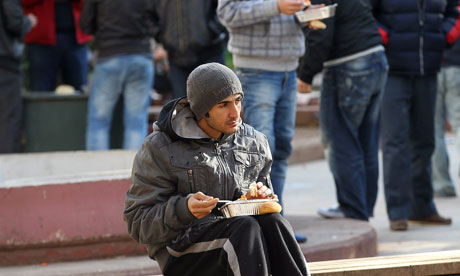Helena Smith guardian.co.uk, Wednesday 15 February 2012 20.39 GMT
Hostility levels have reached maximum as savage austerity measures threaten to bring Greece to its knees
A young man eats outside a soup kitchen in Athens. More and more people are becoming destitute as austerity measures bite. Photograph: Orestis Panagiotou/EPA
There may never have been much love lost between Germany and Greece but on Wednesday it was clear relations between Europe's paymaster and its most indebted state had reached a new level of hostility.
If there was any doubt that the gloves were off it was removed by Evangelos Venizelos, the Greek finance minister early in the day. "Our country," he said, "is waging a battle of survival within the eurozone. This is because, manifestly, there are now powers in Europe who are playing with fire, who believe not all requirements will be met … and who consequently want Greece out of the eurozone."
Three years into the debt crisis it was clear that any diplomacy that might have dominated attempts to end it thus far had been replaced by anger and exasperation. And not just in the capitals of northern Europe.
Venizelos's outburst, hours before a crucial teleconference with eurozone counterparts over Athens's ability to apply cuts in return for the €130bn in rescue loans it desperately needs to stay afloat, was proof that tempers were being sorely tested in Greece, too.
The debt-stricken country may have delayed delivering the reforms its "troika" of international creditors at the EU, ECB and IMF say are vital to kick-starting its economy. But increasingly officials complain that the goalposts are also being constantly shifted.
"It's quite obvious studying their statements and their leaks," said a government source, referring to officials in Berlin, "that they are pushing for default. They want to get rid of Greece and then Portugal and create a smaller eurozone that will be closer to their interests. They start with leaks and then put them on the table as proposals."
Venizelos, he said, had been apoplectic at the latest leak that EU officials were considering delaying part, or all, of the rescue deal – the country's second bailout — until after general elections in April.
After weeks of talks between Athens and the troika, the Greek parliament endorsed draconian austerity measures attached to the loan agreement on Sunday, but not without violent street protests and both of the interim coalition government's major parties losing more than 40 MPs who refused to back the policies. An integral part of the deal – a bond swap with private sector holders of Greek debt that will automatically slice €100bn from Greece's €350 debt pile — has to be completed within days if it is to be ready in time.
"We're not going to play the proud Greek and do anything that would jeopardise our situation, but this latest leak that the program might be delayed until after elections made him [Venizelos] really angry," said the insider. "They say these things and then the markets react violently and then we've got another crisis. Every time we try to heal a little wound another one comes along."
"It's rough out there and not very polite," said another Greek official participating in the negotiations. "Our European partners look us straight in the eyes and say 'how can we trust you?'"
The release of a new poll on Wednesday showing a majority of German business leaders felt it was time Greece left the euro added to the sour mood. Although heartened by offerings of support by socialists in Europe, including the French presidential contender, François Hollande, Greek officials say the shock therapy now being administered to Greece after almost two years of savage spending cuts has dramatically hindered any attempt to improve its economic position.
Figures released by the nation's statistics agency this week showed that Greece is going through one of the biggest slumps in western history, with its GDP plunging 7% on an annual basis in the fourth quarter from a year earlier, faster than the 6.8%decline for all of 2011.
"They want sound figures in the economy but with dead citizens," said another insider, saying the austerity Greece was being forced to mete out in return for aid was coming perilously close to killing the patient.
Greek-German relations at new low as eurozone crisis rumbles on | Business | The Guardian
![The [Greek] European Tragedy](https://blogger.googleusercontent.com/img/b/R29vZ2xl/AVvXsEiWKI5s90SFm1wWTk6bs4p7CgslaC2SnYPsrZhb-B-smOufNNCSxCvpBLI9hOB-LsXZjir_PNmEiMk2-E62F3xkg96IoC6QFAaZAnPRTVH340IN9WBRmWJqPkjWlgyRj3zpALp7h6hvA58/s920/GkBack_new.jpg)

